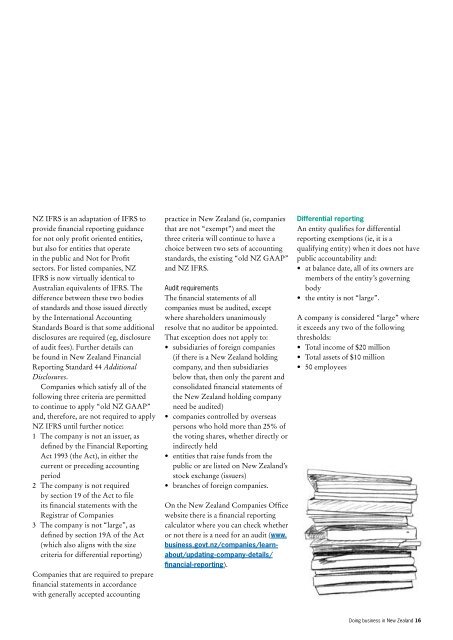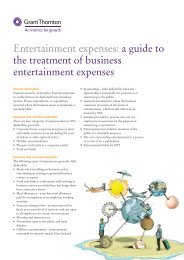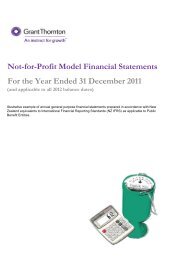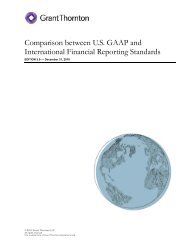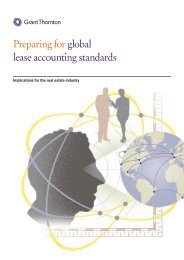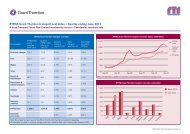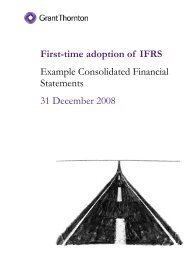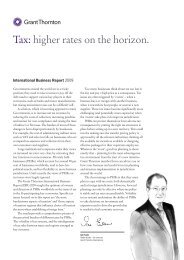Doing business in New Zealand - Grant Thornton
Doing business in New Zealand - Grant Thornton
Doing business in New Zealand - Grant Thornton
Create successful ePaper yourself
Turn your PDF publications into a flip-book with our unique Google optimized e-Paper software.
NZ IFRS is an adaptation of IFRS to<br />
provide f<strong>in</strong>ancial report<strong>in</strong>g guidance<br />
for not only profit oriented entities,<br />
but also for entities that operate<br />
<strong>in</strong> the public and Not for Profit<br />
sectors. For listed companies, NZ<br />
IFRS is now virtually identical to<br />
Australian equivalents of IFRS. The<br />
difference between these two bodies<br />
of standards and those issued directly<br />
by the International Account<strong>in</strong>g<br />
Standards Board is that some additional<br />
disclosures are required (eg, disclosure<br />
of audit fees). Further details can<br />
be found <strong>in</strong> <strong>New</strong> <strong>Zealand</strong> F<strong>in</strong>ancial<br />
Report<strong>in</strong>g Standard 44 Additional<br />
Disclosures.<br />
Companies which satisfy all of the<br />
follow<strong>in</strong>g three criteria are permitted<br />
to cont<strong>in</strong>ue to apply “old NZ GAAP”<br />
and, therefore, are not required to apply<br />
NZ IFRS until further notice:<br />
1 The company is not an issuer, as<br />
def<strong>in</strong>ed by the F<strong>in</strong>ancial Report<strong>in</strong>g<br />
Act 1993 (the Act), <strong>in</strong> either the<br />
current or preced<strong>in</strong>g account<strong>in</strong>g<br />
period<br />
2 The company is not required<br />
by section 19 of the Act to file<br />
its f<strong>in</strong>ancial statements with the<br />
Registrar of Companies<br />
3 The company is not “large”, as<br />
def<strong>in</strong>ed by section 19A of the Act<br />
(which also aligns with the size<br />
criteria for differential report<strong>in</strong>g)<br />
Companies that are required to prepare<br />
f<strong>in</strong>ancial statements <strong>in</strong> accordance<br />
with generally accepted account<strong>in</strong>g<br />
practice <strong>in</strong> <strong>New</strong> <strong>Zealand</strong> (ie, companies<br />
that are not “exempt”) and meet the<br />
three criteria will cont<strong>in</strong>ue to have a<br />
choice between two sets of account<strong>in</strong>g<br />
standards, the exist<strong>in</strong>g “old NZ GAAP”<br />
and NZ IFRS.<br />
Audit requirements<br />
The f<strong>in</strong>ancial statements of all<br />
companies must be audited, except<br />
where shareholders unanimously<br />
resolve that no auditor be appo<strong>in</strong>ted.<br />
That exception does not apply to:<br />
• subsidiaries of foreign companies<br />
(if there is a <strong>New</strong> <strong>Zealand</strong> hold<strong>in</strong>g<br />
company, and then subsidiaries<br />
below that, then only the parent and<br />
consolidated f<strong>in</strong>ancial statements of<br />
the <strong>New</strong> <strong>Zealand</strong> hold<strong>in</strong>g company<br />
need be audited)<br />
• companies controlled by overseas<br />
persons who hold more than 25% of<br />
the vot<strong>in</strong>g shares, whether directly or<br />
<strong>in</strong>directly held<br />
• entities that raise funds from the<br />
public or are listed on <strong>New</strong> <strong>Zealand</strong>’s<br />
stock exchange (issuers)<br />
• branches of foreign companies.<br />
On the <strong>New</strong> <strong>Zealand</strong> Companies Office<br />
website there is a f<strong>in</strong>ancial report<strong>in</strong>g<br />
calculator where you can check whether<br />
or not there is a need for an audit (www.<br />
<strong>bus<strong>in</strong>ess</strong>.govt.nz/companies/learnabout/updat<strong>in</strong>g-company-details/<br />
f<strong>in</strong>ancial-report<strong>in</strong>g).<br />
Differential report<strong>in</strong>g<br />
An entity qualifies for differential<br />
report<strong>in</strong>g exemptions (ie, it is a<br />
qualify<strong>in</strong>g entity) when it does not have<br />
public accountability and:<br />
• at balance date, all of its owners are<br />
members of the entity’s govern<strong>in</strong>g<br />
body<br />
• the entity is not “large”.<br />
A company is considered “large” where<br />
it exceeds any two of the follow<strong>in</strong>g<br />
thresholds:<br />
• Total <strong>in</strong>come of $20 million<br />
• Total assets of $10 million<br />
• 50 employees<br />
<strong>Do<strong>in</strong>g</strong> <strong>bus<strong>in</strong>ess</strong> <strong>in</strong> <strong>New</strong> <strong>Zealand</strong> 16


